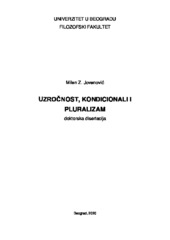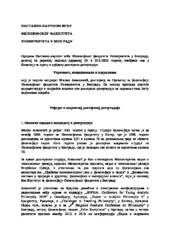Приказ основних података о дисертацији
Uzročnost, kondicionali i pluralizam
Causation, conditionals and pluralism
| dc.contributor.advisor | Milojević, Miljana | |
| dc.contributor.other | Božičković, Vojislav | |
| dc.contributor.other | Lazović, Živan | |
| dc.contributor.other | Blagojević, Bojan | |
| dc.creator | Jovanović, Milan Z. | |
| dc.date.accessioned | 2021-02-09T15:15:09Z | |
| dc.date.available | 2021-02-09T15:15:09Z | |
| dc.date.issued | 2020-12-12 | |
| dc.identifier.uri | http://eteze.bg.ac.rs/application/showtheses?thesesId=7885 | |
| dc.identifier.uri | https://fedorabg.bg.ac.rs/fedora/get/o:23207/bdef:Content/download | |
| dc.identifier.uri | http://vbs.rs/scripts/cobiss?command=DISPLAY&base=70036&RID=31012361 | |
| dc.identifier.uri | https://nardus.mpn.gov.rs/handle/123456789/17796 | |
| dc.description.abstract | Ova doktorska disertacija bavi se savremenim pojmovnim analizama uzročnosti. U centru njene pažnje nalaze se Luisova (David Lewis) protivčinjenička analiza uzročnosti i Holov (Ned Hall) uzročni pluralizam. Preciznije, u njoj se ispituje mogućnost formulisanja adekvatne pojmovne analize uzročnosti u širem okviru luisovskog projekta (LP), tj. mogućnost formulisanja teorije koja koristi Luisovu protivčinjeničku analizu ili je izgrađena na njenim osnovama. Glavna tvrdnja disertacije je da se pod okriljem LP ne može formulisati kompletna i adekvatna pojmovna analiza uzročnosti. Argument koji nudim u prilog ovoj tezi suštinski zavisi od mog određenja LP kao metodološki hibridnog istraživačkog programa, koji nastoji da u sebe inkorporira sledeće dve karakteristike: izvesne realističke pretpostavke o uzročnoj relaciji, kao i svakodnevne intuicije o prirodi uzročnosti. Ipak, te dve karakteristike stvaraju napetost u samom projektu i dovode do sukobljenih zahteva i kriterijuma koje bi neka data teorija (iz LP) morala da ispuni. U disertaciji nastojim da pokažem da upravo tako opisana tenzija objašnjava i druge brojne probleme s kojima se susreće kako Luisova, tako i Holova pluralistička teorija uzročnosti koja prihvata osnovne pretpostavke LP. Disertaciju počinjem sažetom analizom Raselovog (Bertrand Russell) argumenta protiv uzročnog realizma. Podvlačeći slabosti u Raselovoj argumentaciji, pokušao sam da pokažem kako ta poznata i uticajna kritika ipak nije uspela da spreči ili obeshrabri mnoge savremene teoretičare uzročnosti da budu realisti, makar u nekom skromnom smislu. U drugom delu, okrećem se Luisovoj protivčinjeničkoj teoriji (PT), kao vrlo obećavajućoj reduktivnoj analizi uzročnosti sa umerenim realističkim pretpostavkama (RP). Međutim, originalna verzija PT suočava se sa problemom kasnog predupređivanja, zbog kojeg Luis kasnije u teoriju uvodi pojam kvazizavisnosti. Uvođenje tog pojma ipak ne rešava u potpunosti problem kasnog predupređivanja ali zauzvrat rasvetljava postojanje sukobljenih zahteva unutar same PT – da uzročnost treba da bude istovremeno i intrinzična i ekstrinzična relacija. Tako otkriveni unutrašnji sukob bio je ujedno i razlog zbog kojeg Luis odustaje od PT i formuliše teoriju uzročnog uticaja (TU). Nakon izlaganja i razmatranja nekih poznatih argumenata protiv TU, i bavljenja problemom verne interpretacije te teorije, ponudio sam novi protivprimer za – prema mom mišljenju – najdobronamerniju interpretaciju TU. Na kraju, nastojim da pokažem da brojni problemi koje TU ne može da reši ukazuju na to da ona nije korak napred ka adekvatnoj teoriji uzročnosti. Predmet trećeg dela disertacije je uzročni pluralizam (UP). Taj deo počinje definisanjem UP, a nastavlja se izlaganjem i analizom njegovih različitih tipova. Budući da sam u radu posebno zainteresovan za Holov uzročni dualizam (kao teoriji koja pripada LP), istražujem da li ta verzija UP može rešiti ranije pomenuti sukob između suprotstavljenih uzročnih određenja i bude od pomoći za izgradnju adekvatne teorije uzročnog govora. Iako disjunktivna strategija Holovog UP rešava neke od problema s kojima se susreće PT, nastojim da pokažem da se problemi nalik njima ponovo javljaju, što dokazuje da je i ta teorija ipak neuspešna. Štaviše, Holova teorija pokazuje, na još očigledniji način, duboke metodološke probleme u vezi sa ulogom i značajem uzročnih intuicija za LP. Četvrti i zaključni deo disertacije posvećen je metodološkim problemima LP. Na tom mestu nudim dijagnozu prema kojoj glavni izvor pominjanih problema leži u dubokom konfliktu između realističkih pretpostavki LP i njegove teorijske aspiracije da inkorporira svakodnevne uzročne intuicije. Namera mi je da pokažem da je te dve ambicije zapravo nemoguće pomiriti, budući da realističke pretpostavke vode u odbacivanje pragmatičkih faktora kao relevantnih za uzročnu analizu, dok insistiranje na slaganju sa intuicijama (kao kriterijumu za adekvatnost teorije) naglašava značaj upravo tih pragmatičkih faktora koje nastojimo da ignorišemo. Taj negativni rezultat, ukoliko je ubedljiv, može se posmatrati kao jak argument u prilog kontekstualizmu u filozofskim teorijama uzročnog govora. Disertaciju zaključujem kratkom analizom perspektive, privlačnosti i ubedljivosti te pozicije | sr |
| dc.description.abstract | This doctoral dissertation is concerned with contemporary conceptual analyses of causation. It primarily focuses on Lewis’s counterfactual theories of causation and Hall’s causal pluralism. Specifically, the dissertation investigates the possibility of developing adequate conceptual analysis of causation within (broadly construed) Lewisian project (LP): by using Lewis’s counterfactual analysis or building further upon it. The central claim of the dissertation is that LP cannot succeed in offering a complete and adequate conceptual analysis of causation. The argument I have provided in favour of this claim depends crucially on my account of LP as a methodologically hybrid research programme that aims to incorporate both: certain realistic assumptions about causal relation on the one hand and ordinary linguistic intuitions about causation, on the other. However, these two characteristics create strong tension within the project and lead to conflicting demands and criteria that given theory (from the LP) has to meet. In this dissertation I claim that this internal conflict can also explain further problems that both Lewis’s and Hall’s pluralistic theory of causation (both belonging to LP) face. I begin the dissertation with a brief analysis of Russell’s argument against causal realism. By highlighting the flaws in Russell’s argumentation, I aim to show that such an influential critique still does not deter many of the contemporary causal theorists from being realists, at least, in some modest sense. In the second chapter, I turn to Lewis’s Counterfactual Theory (CT), as the promising reductive analysis of causation with modest realistic assumptions (RA). Nevertheless, the original version of CT has faced the problem of late pre-emption, which led Lewis to introduce the notion of quasi-dependence into the theory. The introduction of quasi-dependence did not solve the problem of late pre-emption, but it has revealed conflicting requirements for the causal relation within CT, namely that causation should be both intrinsic and extrinsic relation. That was the reason why Lewis gave up on the CT and formulated the Influence Theory of Causation (IT). After presenting and evaluating some well-known arguments against IT, and examining issues pertaining to the right interpretation of that theory, I offer a new counterexample to – what I deem to be – the most charitable reading of IT. Finally, several different problems and difficulties with IT prove that IT represents a futile attempt to formulate an adequate theory of causation. The topic of the third part of the dissertation is causal pluralism (CP). I start by defining CP, and proceed by presenting and analysing different types of CP. Especially interested in Hall’s causal dualism (as the theory that belongs to LP), I examine whether this version of CP can resolve the (earlier indicated) conflict between opposing causal restrictions and help formulate an adequate conceptual analysis of causation. Although the disjunctive strategy of Hall’s CP solves some of the problems faced by CT, I argue that similar issues are reoccurring, proving the theory ultimately unsuccessful. Moreover, Hall’s theory brings to the light, even more vividly, deep methodological problems concerning the role and importance of causal intuitions within LP. The fourth and concluding chapter of the dissertation addresses some methodological problems of LP. There I offer a diagnosis according to which the source of those problems lies in the deep conflict between RA of LP and its theoretical aspiration to incorporate everyday causal intuitions and provide a conceptual analysis that is essentially a theory of causal talk. I try to establish that those two ambitions are impossible to reconcile since RA results in rejecting the pragmatic factors as relevant for causal analysis while insisting on agreeing with intuitions (as the adequacy criterium for the theory) highlights the importance of exactly those conversational and contextual factors we aim to ignore. This negative result, if plausible, can be regarded as a strong argument in favour of contextualism in philosophical theories of causal talk. I conclude the dissertation by briefly examining the prospects of this position. | en |
| dc.format | application/pdf | |
| dc.language | sr | |
| dc.publisher | Универзитет у Београду, Филозофски факултет | sr |
| dc.relation | info:eu-repo/grantAgreement/MESTD/Basic Research (BR or ON)/179041/RS// | |
| dc.relation | info:eu-repo/grantAgreement/MESTD/MPN2006-2010/149010/RS// | |
| dc.rights | openAccess | en |
| dc.rights.uri | https://creativecommons.org/licenses/by-nc/4.0/ | |
| dc.source | Универзитет у Београду | sr |
| dc.subject | Protivčinjenička teorija uzročnosti | sr |
| dc.subject | counterfactual theory of causation | en |
| dc.subject | causal pluralism | en |
| dc.subject | influence theory of causation | en |
| dc.subject | causal dualism | en |
| dc.subject | causal realism | en |
| dc.subject | methodology | en |
| dc.subject | intuitions | en |
| dc.subject | contextualism | en |
| dc.subject | uzročni pluralizam | sr |
| dc.subject | teorija uzročnog uticaja | sr |
| dc.subject | uzročni dualizam | sr |
| dc.subject | uzročni realizam | sr |
| dc.subject | metodologija | sr |
| dc.subject | intuicije | sr |
| dc.subject | kontekstualizam | sr |
| dc.title | Uzročnost, kondicionali i pluralizam | sr |
| dc.title.alternative | Causation, conditionals and pluralism | en |
| dc.type | doctoralThesis | en |
| dc.rights.license | BY-NC | |
| dcterms.abstract | Милојевић, Миљана; Лазовић, Живан; Благојевић, Бојан; Божичковић, Војислав; Јовановић, Милан З.; Узрочност, кондиционали и плурализам; Узрочност, кондиционали и плурализам; | |
| dc.identifier.fulltext | https://nardus.mpn.gov.rs/bitstream/id/67960/IzvestajKomisije23607.pdf | |
| dc.identifier.fulltext | https://nardus.mpn.gov.rs/bitstream/id/67959/Disertacija.pdf | |
| dc.identifier.rcub | https://hdl.handle.net/21.15107/rcub_nardus_17796 |



